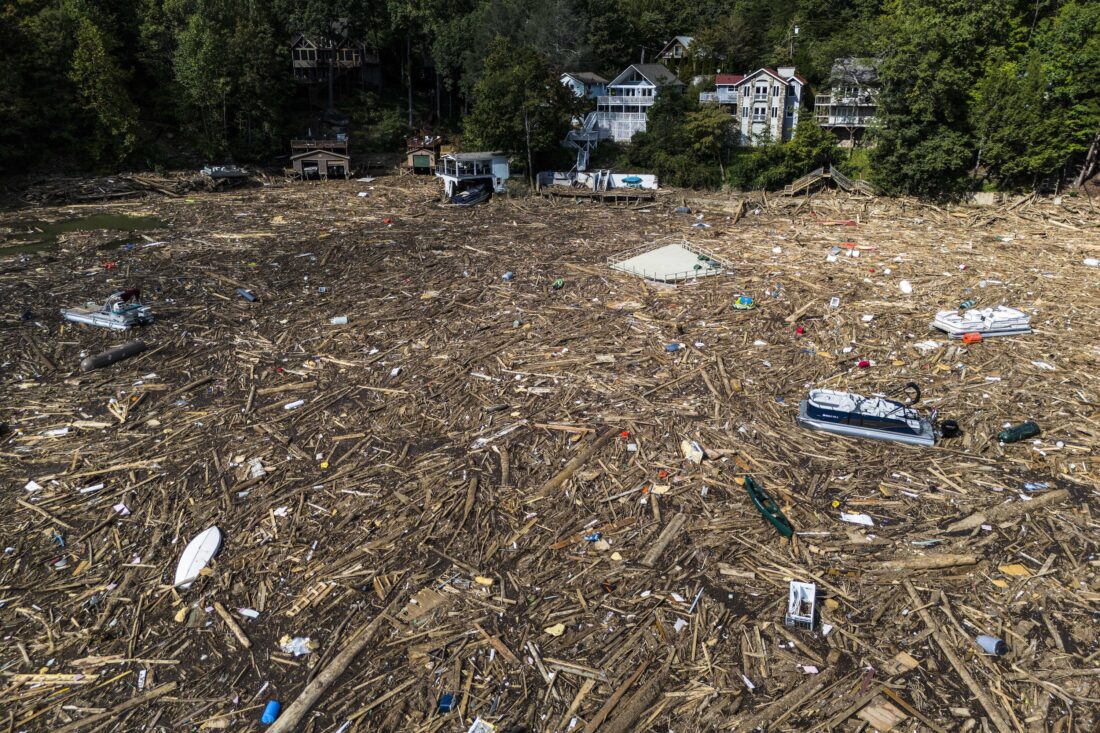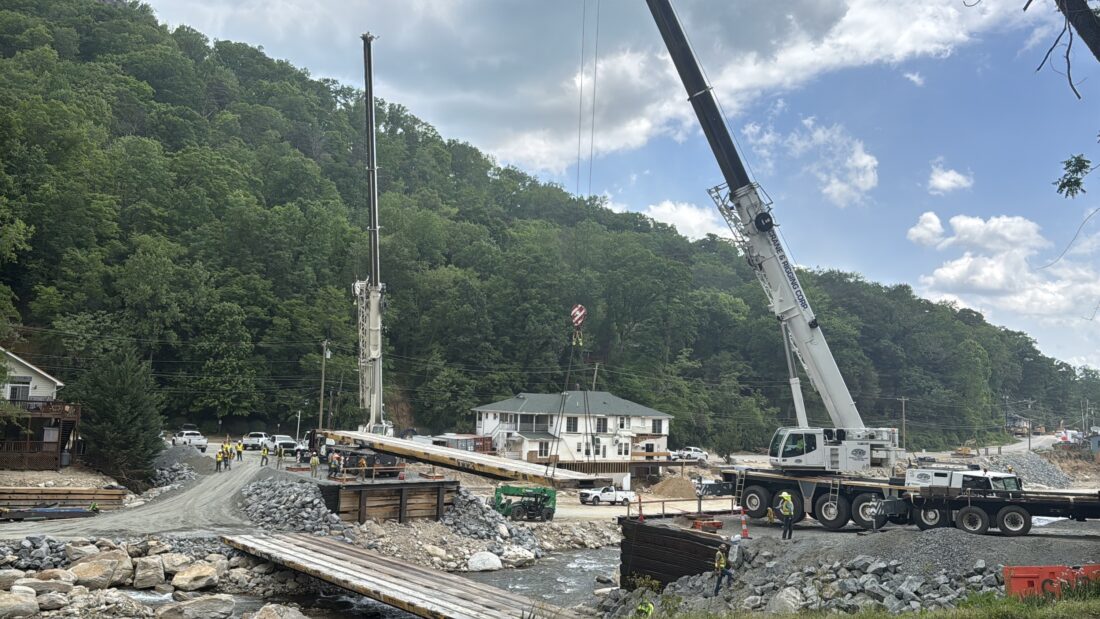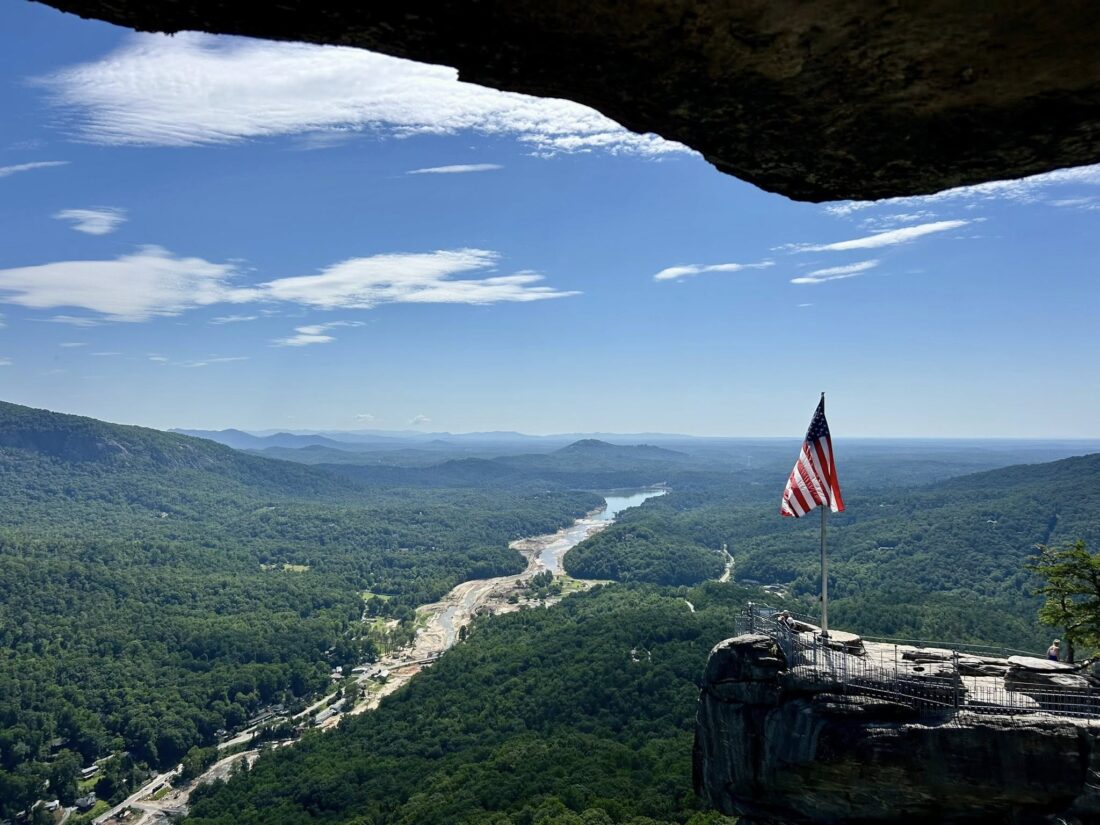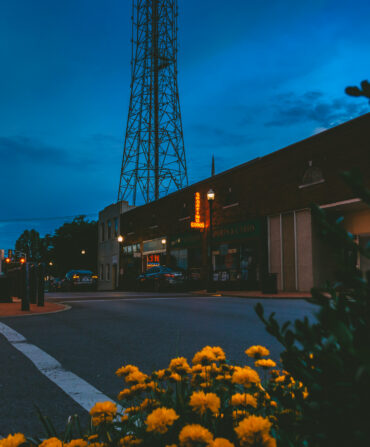Some of the earliest images to come out of Western North Carolina in the wake of Hurricane Helene were of the Chimney Rock area, where the surrounding small towns had completely washed away. In the state of North Carolina, there were 108 verified storm-related deaths, and in the days following the storm, the first thing the staff of Chimney Rock State Park did once they could enter the park was raise the flag on the mountain to half-mast. “We had first responders, officials, and rangers in Chimney Rock Village look up and they could see the flag, and that was hope,” said superintendent James Ledgerwood late last month as a group assembled beneath the 535-million-year-old monolith rock for which the park is named. The gathering marked the park’s official reopening—and the moment when the park again flew the flag at full mast.
“This is an iconic park for not just Western North Carolina, but all over the Southeast and beyond,” says Emily Walker, the park’s director. “Many of our visitors have been coming here for generations.” Helene’s unprecedented rain caused flooding that washed away the park’s entrance bridge, destroyed the Old Rock Cafe, and damaged the winding road up the mountain. The elevator up to the rock flooded, and landslides swept away retaining walls.

Now, after nine months of cleanup and repair, the park is welcoming people again via a reservation system. From the top of Chimney Rock, a seventy-five-mile panoramic view of the Hickory Nut Gorge awaits, overlooking the recovery efforts continuing below.
“The village of Chimey Rock ended up in Lake Lure,” says Carol Pritchett, mayor of Lake Lure. “The speed and the force of the water coming down the Broad River and its tributaries was something none of us could have imagined.” Landslides, coupled with the overflow of the river, damaged or swept away most of the village’s infrastructure. Fully a third of the forty-six businesses were destroyed. In neighboring Lake Lure, the raging waters damaged the dam and knocked out the wastewater treatment plant, and lakeside homes filled with silt. “Our firefighters and our police force went door-to-door over and over until they identified where every single person was,” Pritchett says. “So many people came and volunteered and worked shoulder to shoulder.”
At first, the lack of cell service and the lost bridges made the rescue and cleanup efforts especially difficult. “But even early on, when there was no cell service and we were in the worst of the devastation, I felt a sense of hope from watching the people of these communities help each other,” Walker says. In the months since the storm, both Chimney Rock Village and Lake Lure have made steady headway. Most people have moved back into their homes around the lake, and businesses are starting to reopen in the village.

Restaurants and hotels, including the Lodge on Lake Lure and Rumbling Bald, have reopened. By the end of the summer, Pritchett hopes a new cell tower will be in place. Currently, the only road into the area is North Carolina Highway 9 through Lake Lure. The lake itself remains a work in progress; it was filled with so much debris and silt that the Army Corps of Engineers requested that its level be dropped by thirty feet to allow for cleanup. So far, teams have removed 600,000 tons of sediment and are still excavating, but Pritchett projects that by springtime or maybe earlier, they can raise the level back to normal and allow people back on the water.
Looking ahead, many locals say that what the region most needs is the return of visitors—not to gawk at the remaining damage, but to celebrate the beauty that is still there and put much-needed money into the local economy.
“We’re trying to be honest and let people know what there is to do here,” Pritchett says. “Some of our trails and our golf courses are open, and now Chimney Rock State Park is back open, too. The fall is going to be beautiful and we still have a lot to offer. Our restaurants and hotels are ready—all we are missing is the tourists.”
Lindsey Liles joined Garden & Gun in 2020 after completing a master’s in literature in Scotland and a Fulbright grant in Brazil. The Arkansas native is G&G’s digital reporter, covering all aspects of the South, and she especially enjoys putting her biology background to use by writing about wildlife and conservation. She lives on Johns Island, South Carolina.








